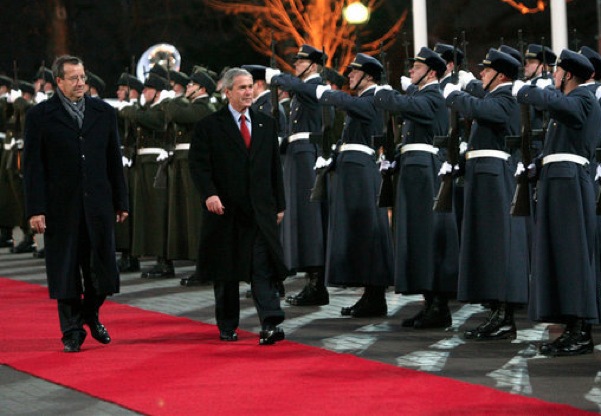With all these post-Schalit deal shifting alliances between Hamas, Fatah and Israel, it seems that what the three parties really need is a common enemy.
By Joel Silberman
A pernicious threat is gathering for the Middle East, a danger that jeopardizes Palestinians and Israelis alike. Though rarely addressed publicly – not in the Knesset or the Muqata, the UNGA or the blogosphere – its looming peril is real. This menace does not differentiate between Muslims, Christians or Jews and, if left unchecked, it promises to push everyone from Jericho to Tel Aviv into the sea.
I speak, of course, of Estonia.
You may say you’ve never heard of this “Estonian Threat,” and that is a perfectly valid position. After all, I made it up. But just because a threat does not exist today does not mean that it could not exist tomorrow. And it should exist tomorrow. I would modestly propose that it must exist tomorrow, especially in light of the continuing escalation around the Gaza Strip.
Allow me to explain why I’m not crazy.
Last month’s long-overdue prisoner-swap deal between Israel and Hamas evinces an old truism of mediation: the quickest way to bridge the gap between two parties is to unite them against a third. Israel may claim that Hamas became more flexible and Hamas may insist that Israel changed position, but this is constituent theater. The reality is that this deal looks almost exactly like what was proposed when Gilad Schalit was first captured five years ago, the difference being that Mahmoud Abbas’ UNGA speech put Israel on the defense diplomatically and Hamas on its heels politically. Khaled Meshal needed to undercut his rival’s prestige in Palestine, Bibi Netanyahu sought to undermine Abbas’s legitimacy on the world stage, and from this sudden alignment of interests, a long-gestating deal was born. Now both sides are escalating violence to show their constituents they’re still tough – despite working together.
Still, if this “enemy of my enemy is my friend” logic can bring together the most irascible foes in the Middle East, even if only circumstantially and temporarily, it therefore stands to reason that all Israelis and Palestinians would be well-served by the invention of a mutual enemy. No actual violence need be perpetrated by this new, manufactured bogeyman. After years of conflict, both peoples are already extremely sensitive to perceived threats. A little saber-rattling should be more than enough.
The question, then, is who would make a good enemy, and Estonia is an excellent candidate for several reasons: For one, it has no history in the region to speak of, which makes it easier to fabricate animosity on both sides. Its low Muslim population means it can credibly threaten Palestine and Israel equally, and its stock of long-range weaponry is just large enough to be wildly hyped into an existential threat for both. Estonia is also geographically close enough for newscasts to draw ominous red arrows on maps from its capital, Tallinn, to Jerusalem, yet still far enough away to prohibit preemptive strikes.
Perhaps most importantly, Estonia seems like the type of country that would be kind enough to masquerade as a villain for Israelis and Palestinians in the interest of world peace. Indeed, it would practically be Finland if it weren’t for the Baltic Sea, and when then-President George W. Bush made his official visit in 2006, the Estonians formally presented him with a Skype phone. Is there anything a state can do that’s sweeter than helping a cash-strapped ally save money on long-distance? I think not.

So what do you say, Estonia? Want to join your fellow Scandinavians in their distinguished history of Middle East peace midwifery? Albeit in a new and slightly obtuse way? I realize that it might sound far-fetched, but somebody needs to do something to push these people towards progress.
And no one else seems willing to step up.
Joel Silberman is a writer and humorist in Los Angeles. Before moving to Hollywood, he worked for a variety of political organizations including the Geneva Initiative in Tel Aviv, the List Project to Resettle Iraqi Allies and Barack Obama’s Presidential campaign. His first television script follows a Middle East peace negotiator, his second a political campaign, and his former employers are mostly amused that he now makes his profession dramatizing and satirizing them. He studied Creative Writing at Brown University. His opinions do not represent any organization or group. His email address is: Joel@Wordpeggio.com
